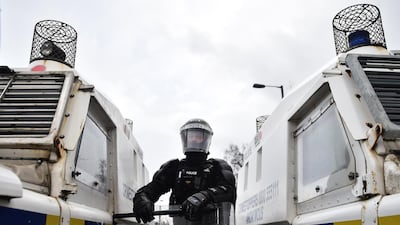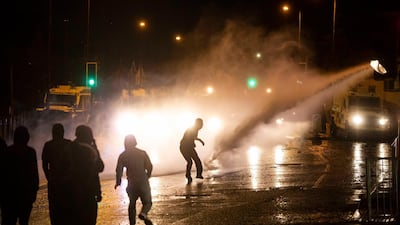Imagine the pain of a daughter, whose mother was killed by army bullets in 1971, having to plead her innocence in front of television cameras this year.
That has been the experience of Briege Voyle, one of eight children of Joan Connolly, a woman from Belfast who was killed in the Ballymurphy Massacre 50 years ago. It was only last week that a judge ruled that the 10 people shot by British Army paratroopers, including Mrs Connolly, were "entirely innocent". They had been killed after an operation was launched against members of the Irish Republican Army.
It is natural and only right that a state should seek to acknowledge both its wrongdoing and responsibility when innocent people are killed by its forces. Yet in Northern Ireland, that is a deeply controversial issue – hence the five-decade wait.
With more than 3,000 killed in the 30 years of the so-called Troubles that began in 1968, critics carp that the process is nothing but dredging the past and thus debilitating the present. One Belfast author maintains that the truth about that past is an unattainable quest. "We need to stop lying to people about the truth," said Brian Rowan, author of Political Purgatory, a book that documents the failure of politics following the peace process between the pro-British Unionists and Nationalists.

The problem in Northern Ireland could be wearily boiled down to old sores. When something is deeply felt by one side of the Catholic-Protestant sectarian divide, it antagonises or is neuralgic to the others.
Protestants don’t share the visceral reaction that Catholics experience when something like the Ballymurphy Inquest lays out injustice. If the spotlight shifts to a massacre of Protestants, such as the Kingsmill Massacre, then flickers of the same demands for a reckoning burst into life. The families of the 10 victims of that 1976 ambush by Republicans still wait for the suspects to be named in a formal process.
Moreover, these concerns grip the public imagination in quick succession. The week before the Ballymurphy Inquest saw the controversial collapse of a trial of soldiers now aged in their 70s and long since rotated out of Northern Ireland.
To address the concerns of MPs in the UK on the matter, British Prime Minister Boris Johnson used Queen Elizabeth II's speech on Tuesday to promise a law that would stop prosecutions for incidents before the 1998 Good Friday Agreement.
Allegations immediately followed that this was an escape hatch for veterans and a demonstration of how and why London is not to be trusted. Mr Johnson then raised hackles yet further with a backhanded statement on Ballymurphy, not speaking to camera but dribbling out a statement in two parts.
Almost more prevalent than discussions about taxes, education or health is the word "legacy" in Northern Ireland. Legacy consists of a piecemeal, disputed rotation between trials in the courts, full-scale commissions such as the Bloody Sunday Inquiry and belated inquests that keep the Troubles ever present for the people there and beyond.
The alternative would be to have a South African-style pursuit of the truth, advocated by former British prime minister Tony Blair and former secretary of state for Northern Ireland Peter Hain, two men instrumental in the Good Friday Agreement.
A platform for victims and perpetrators to have their say would obviously last a long time and have its own consequences. But to proponents, it would at least represent the beginning of the end. It would be a vehicle to allow information recovery and reconciliation. The damaging “cycle of investigations” would be broken.


Last week, Mr Blair said that he would have done it 20 years ago when he was in power but could not build enough consent for the idea. He believes the current set-up does not resolve the pain and never will.
Perhaps it will allow a wider set of considerations to get an airing, too. This would include the people who lived in mixed cross-sectarian communities but ripped out of their homes by violence. For the children of the 1970s and 1980s, this was an often formative experience. It may also drip-by-drip force those who have closed their ears to the other side to listen.
Of course, if it was easy it would have been done. But the nature of violence in Northern Ireland was different. It wasn’t just the state versus the single rebel movement. A framework that adequately encompassed all the sources of violence would be hard to construct and even harder to maintain.
Peace and reconciliation experts have concluded that such a process cannot be successful without an upfront amnesty for potential crimes of its participants. After all, without drawing the hardmen to the witness stands, a truth and reconciliation commission is only another discussion panel.
A statute of limitations on prosecutors going after the people who pulled the trigger or the commander who gave the orders amounts to simply addressing immediate grievances surrounding activist lawyers and one-sided justice. Amnesties commit a society to a post-conflict future with the sins of the past out there and relegated to a lockbox.
In different ways both proposals require leadership that does not currently exist, either within Northern Ireland or in London. With its future unresolved between remaining in the UK or shifting to the All-Ireland destiny, the north is in a vulnerable place.
Roadblocks of the mind, meanwhile, continue closing in. Legacy is a bitter pill that cannot be swallowed.
Damien McElroy is the London bureau chief at The National










